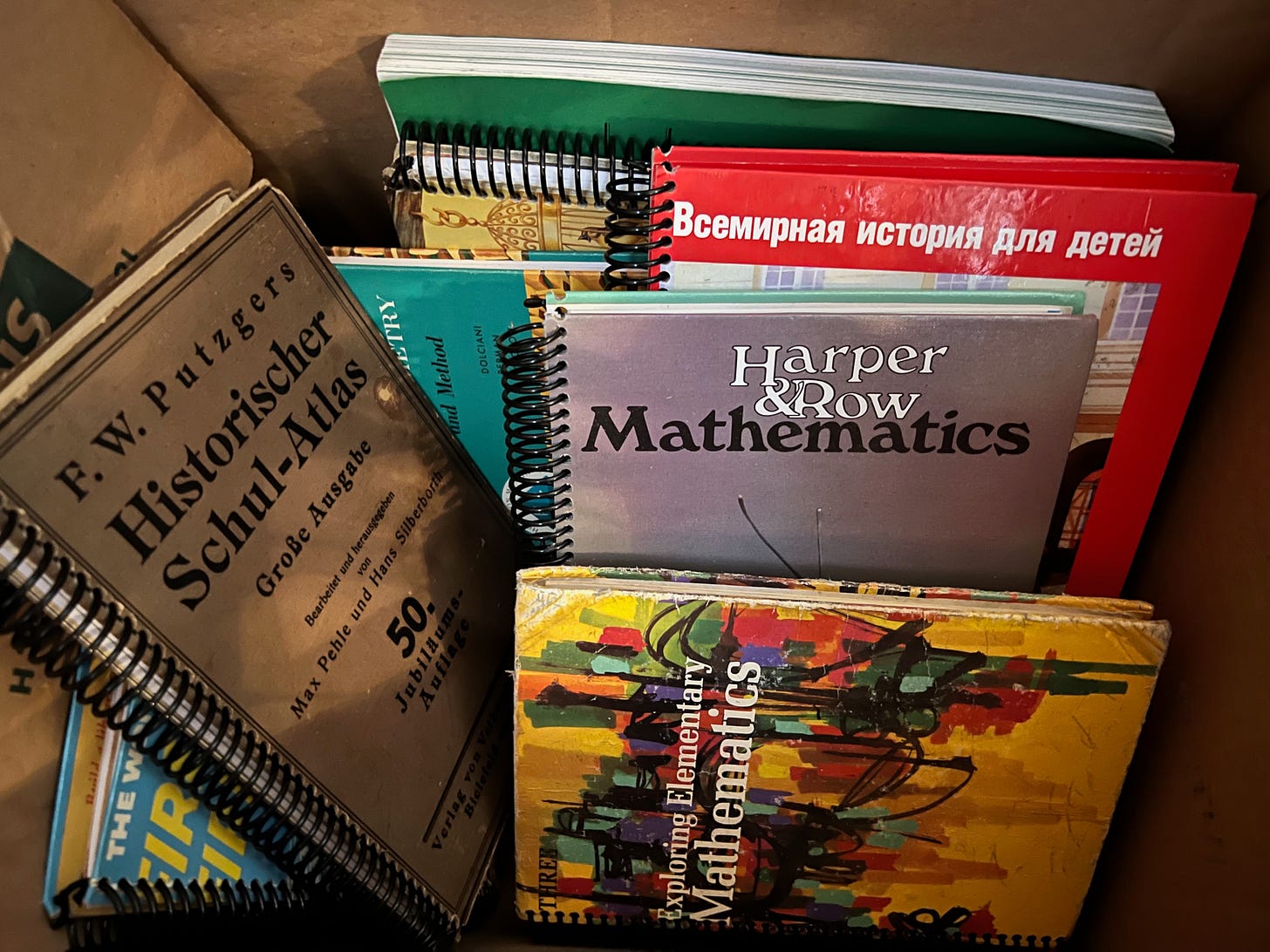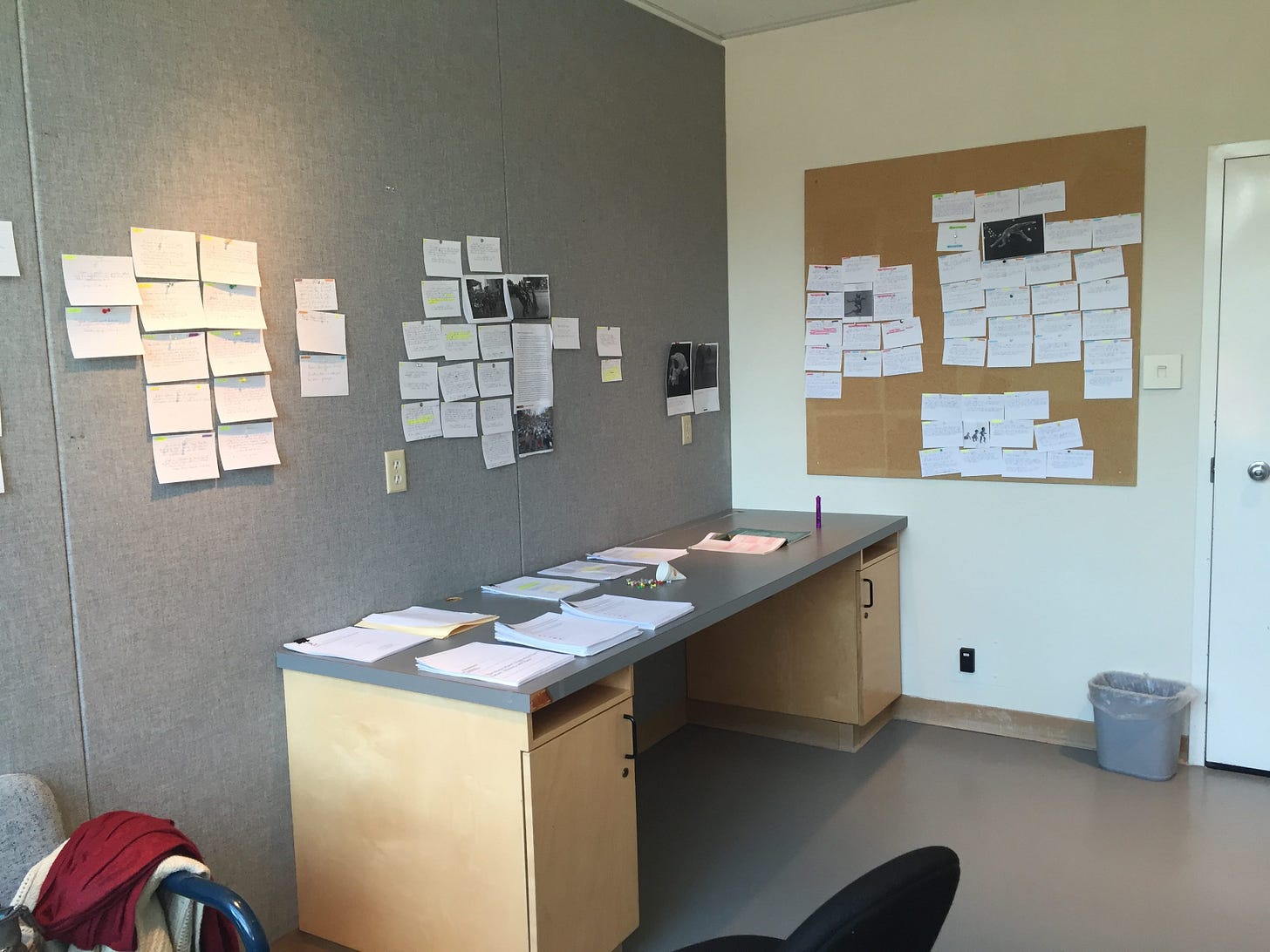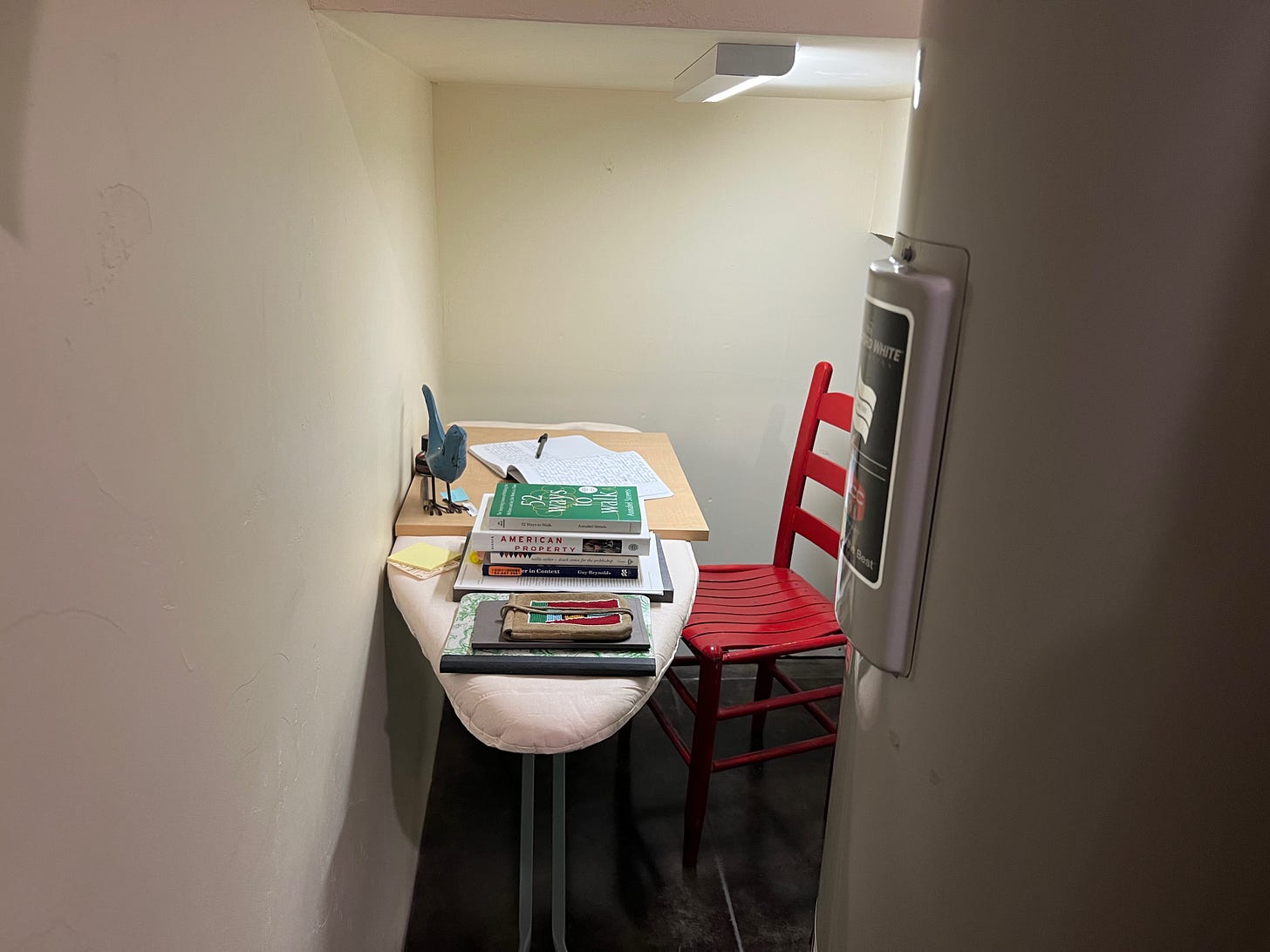For several years, before and for a while after I had kids, I worked on a mystery novel set in eastern Montana. I wrote sketches and backgrounds for the major and minor characters; mapped out plot points, detailed motivations, and background for the murderer (he was a paleontologist selling fossils on the black market to pay for his mother’s cancer treatments), rewrote the entire thing start to finish at least eight times, went to a couple of encouraging mystery writers conferences, and generally had a fun time pitting my two main characters—half-sisters full of mutual resentment—against each other.
One day, sitting in a small, dusty library in an old building in upstate New York and struggling with another revision of said novel, I realized that I’d been forcing the writing for at least a couple of weeks. I dreaded sitting down to any of my works-in-progress, and actually started sneezing whenever I picked up the mystery novel, as if I were allergic to it. But I wasn’t allergic (maybe that was the library); the desire to write had left me.
I don’t mean I was blocked—“writer’s block” is very often just fear—or that I was stuck. This was something new. The desire to craft narrative, to feel the glide of a pen across a notebook or a printout of a manuscript, was just gone.
It was the oddest feeling. The urge to write had been with me almost as long as I could remember. I wrote my first stories at an age so young I barely remember them, though I still have the first “book” I wrote when I was maybe seven or eight years old.

Losing writing showed me how much it’s part of whatever “me” is. I imagine visual artists and musicians and dancers and in fact creators of any kind feel the same. Before writing left, I would have been hard-pressed to explain its neverending urgency to someone who didn’t already know what I was talking about. Like most writers, I received piles of rejections before my essays began finding an audience. Anyone who’s been bitten by a creative bug knows what I mean when I say rejection won’t stop you: It’s not an expression of ambition or some vision of success that keeps you going; it’s the writing itself. I could never have published anything in my entire life and that would have made me sad but it wouldn’t have stopped the writing. “Being a writer” is a full-on embodied thing that exists no matter what kind of feedback or public notice you do or do not get.
Which is, really, strange. I didn’t know how strange until it wasn’t part of my daily existence. I woke up and didn’t feel a need to write. I had a kid-free hour or two and didn’t bring out an essay to revise. I opened my copy editing work for the day and never turned off my work timer to dive into an idea that had just come. I read books for pleasure and never felt a twinge of envy or wonder “How did they do that?” It was probably the most free I’ve ever felt because I realized I could do other things with my life. I could become a firefighter, or apply to do a graduate degree in mathematics, or get a job at one of the local farms.
It was only when it wasn’t there that I realized how much space writing took in every moment of every day, every breath, every thought.

The absence only lasted about three months. I don’t know what writing was off doing during that time—maybe it was sick of reading that mystery novel for the fiftieth go-round. But when it came back, it saturated everything all over again; I could still go pursue firefighting or mathematics or picking overpriced organic tomatoes for weekenders from New York City—I could cook a stew or try to grow cucumbers and kill thistles and not be drawn to turn each of those acts into metaphor for human existence!—but wanting to write about that life was going to ride along no matter what I tried go after.
I’ve only talked to one other writer-friend who’s experienced this absence. She told me she thinks of her writer self as a middle-aged white guy who sits at a battered desk in a dirty office scribbling stuff out and throwing it to his assistant out front to type. And sometimes the writer dude disappears for no reason and the assistant bides their time playing Minesweeper (this conversation was before games other than Minesweeper and solitaire were widely available).
It was an interesting lesson to go through. I’m not sure any of us understand what writing is—what creativity is, for that matter; Arthur Koestler wrote a whole book about it (The Act of Creation, with lingering themes in The Ghost in the Machine) and didn’t really come to persuasive conclusions—much less why some are driven to do it no matter what the circumstances. As my father is fond of reminding me, Dostoevsky wrote in a freezing shack with his family all around, in exile in Siberia, which is partly why I’m not picky about the mechanics or location of the writing I do. I’ve written in coffee shops and libraries, at home with babies climbing on me and on campings trips in the early morning with frozen fingers.

When my last book proposal was rejected, I thought a lot about the time that writing went on vacation. It wasn’t that I was going to write the book no matter what; it was knowing that I could ask my writer self if this was still an idea worth pursuing and could trust the answer (yes). I’m a slow learner—and a slow writer—but I’ve heard enough internal “meh’s” to know when something isn’t going to let go.
I’m always curious about people’s relationship with writing and art. With creativity. There’s a tremendous amount of conflation between writing itself and “getting published,” especially getting a book published. I’m always intrigued when people say they hope to “become a writer”—I remember saying things like that, only realizing later that it was just something I was, not something I could choose to become. Does every one of us have to untangle those two things for ourselves, come to terms with the writer who’s going to be a driving, urgent force in our lives no matter what “success” or recognition we do or do not achieve?
Many of my favorite Russian writers and poets existed in frankly horrific circumstances. Exiled, jailed, living in extreme poverty, loss of children, loss of freedom, loss of country and home. They didn’t write because they hoped for a steady stream of book contracts and speaking engagements for the rest of their lives; they wrote, often at risk of government rebuke, censorship, or worse, because they could not help themselves. This has been true of artists all over the world, and over millennia. The best writers I know right now are writing because the stories want to be told, need to be told, and through them.
It’s not ambition that keeps people going; it’s more like an internal insistence. Not being able to help oneself. It’s why days or weeks without writing time leave me incredibly cranky and difficult to live with. It’s why I’m at this moment sitting at an ironing board set up under the stairs and behind the water heater (it’s the only place I have a chance of not being interrupted for a while, with the added bonus of making me feel more Russian than I actually am by being cold and uncomfortable and smelling strongly of pickles because we have a bucket of them fermenting in the same tiny space).
When that last book proposal was rejected and I thought about the time years ago when writing left, I couldn’t help remembering how much easier life was, how many more possiblities there were for how to spend my time. It hasn’t left in over a decade, but its absence is still visceral. It taught me a straightforward lesson: writing has nothing to do with either form or success—it’s either there or it’s not. A book is one form, as is a magazine byline, as is a blog, as is a speech, as is a letter to an old friend; and that all the book contracts in the world, either behind you or ahead of you, mean nothing when you’re exploring that next idea, seeing if it holds firm, asking it what it wants to be.
What matters in the end is your commitment to the story itself. Like any relationship, where you go together will be unexpected. It will have its griefs as well as its joys and there is always the potential of heartbreaking loss. Success and accolades are never guaranteed, and even when they come, they don’t change what writing—what stories—need from you. The writing might abandon you for a time, but what the story needs to know is that you will never leave it.







I don't know how I missed this post. There's so much I want to say, to respond to -- including the quickening I felt in my heart when I saw your first "book." I, too, have always written and had a time when I submitted and published essays and poems, one after the other. I received a three-week writing residency at Hedgebrook on Whidbey Island during the summer of 2015, and it seems like a dream now. So much has gotten in the way, or I've allowed my mind to fill up, leaving me so little space to really write. I feel, at the age of 59, that I might never possibly complete the book, but that that might be ok. It's like a very dull disappointment that some might say is a cop-out or a give-up or just plain laziness, but I feel a certain freedom in just doing the "small" writing I do mainly for myself now. A daily creative practice that includes watercolor and collage and is deeply pleasing. Reading, I like to say is really my only constant. I am never without a book. That being said, your post INSPIRES me to begin again. Aspire again. Write more seriously with intention again.
Thank you for this. I've been wondering to myself that last few months if "I have what it takes" to be writer. Doubt seeps in. You've reminded me here that by making a consistent writing practice and committing to it, I am a writer. Whether writing into the void, or writing for a substantial audience of readers, I have ideas to share. Connections to make—for myself if for no one else. So, that's what I'll do. Thank you.